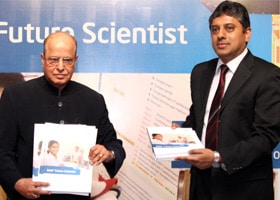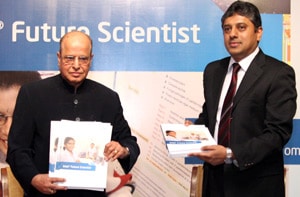
 Intel added another feather in its cap by nationally launching the Intel Future Scientist Program on 29th February 2012. The aim of the program is to promote and nurture the spirit of inquiry among students.
Intel added another feather in its cap by nationally launching the Intel Future Scientist Program on 29th February 2012. The aim of the program is to promote and nurture the spirit of inquiry among students.
An invited audience of over 100 representatives including key policy makers, civil societies, public and private sector organizations from across the country attended the launch event. The launch event was presided by K Kasturirangan, Honorable Member Planning Commission and Member National Innovation Council. The days’ proceedings began with the ceremonial lighting of the lamp by the chief guest Dr Kasturirangan, Dr. Manoharan, Chair Professor of Raman Chair for Mathematics and Science Education, IGNOU, Dr. B P Singh from Department of Science and Technology, Dharam Veer, State Election Commissioner, Haryana and president of SPSTI and Dr. Praveen Vishakantaiah, President Intel India.
Ashutosh Chadha, Director Corporate Affairs Group, Intel South Asia initiated the discussion on Ecosystem Preparedness of Science, Technology, Engineering and Mathematics (STEM) Education. He stressed on inculcating 21st century skills to develop innovation and identifying the key issues that help build a knowledge economy. Gagan Gupta, Subject Expert from NCERT shared the vision of the National Curriculum Framework 2005 and how it envisages inquiry based approach to inculcate scientific temperament among students. He emphasized that the curriculum should be made visible, relevant and connects to real world problems.
Prof Manoharan, Raman Chair for Mathematics and Science Education, IGNOU, emphasized on scientific learning without stress so as to promote creativity. He emphasized on the contribution made by Raman chair on inculcating scientific temper among children. Dr B P Singh, Scientist/Head from Department of Science and Technology emphasized on contextualizing learning in both formal, non-formal education and also shared that formal education must be sensitive enough to be a part of the system.
Dharam Veer, State Election Commissioner, Haryana and president of SPSTI opined that a good foundation of Maths and Science is crucial in today’s world. This would help in instilling the scientific temper among the students and ICT needs to be part of the education system.
An Audio Visual to elaborate the objectives of the program captured the audience’s attention which was followed by a brief overview of the Intel Future Scientist Program. The overview highlighted the goals, objectives and the outcomes of the program.
Intel India President, Praveen Vishakantaiah shared Intel’s vision to connect and enrich every person on the earth by building trust, promoting scientific capability and nurturing the path to success. He emphasized on the continued progress of nurturing pipeline of scientific communities. He elaborated on the global workforce requirement and stressed that the inquiry based learning was the need of the hour which led to the Intel Future Scientist Program.
Dr Kasturirangan during the formal release of the Intel Future Scientist Curriculum said, ‘Intel Future Scientific program has made the demonstrating approach on how to shape the next generation’. He applauded the initiation of the program as a sustained way to promote asset as its own heritage to improve the quality of society which can imbibe the culture of inquiry and innovation. While emphasizing on innovation, he felt that the rural urban divide is no longer an intellectual space. He asked to identify the core problem and bring affordability in the system so that it can bring easy interface with mechanisms, demonstrations and initiation of linkages.
| “Intel Future Scientific program has made the demonstrating approach on how to shape the next generation.” Dr K Kasturirangan, Honorable Member Planning Commission and Member National Innovation Council |
He also said that initiatives to support educational programs have increased from .98% to 2.5% of the GDP. Even the Prime Minister’s office has set mechanisms to work with corporate sectors, support the public-private partnership and provide support to promote research which can bring about transformation and paradigm change.
The launch of the Future Scientist program was followed by an intensive Round Table Discussion on Sustaining the Innovative Streak in Young Geniuses.
There is an urgent need to sustain the brightest innovators and researchers to nurture home-grown talent. The students who have won laurels internationally do not get due recognition when they return back to India and tend to lose out on the opportunities in pursuing their interests. The round table was intended to discuss how to nurture these talents further!
The discussions started with setting the stage for deliberations on how the students who have received global recognition can be given due credit in their home ground. The questions that were brought to the fore for the invited experts to discuss were-
• What are the recommendations that can be put forward to ensure that innovation by the students who have proved their mettle in International Science Fairs like ISEF get recognized in the formal system?
• Why some Universities those have special ECA / Sports quota for admission does not include innovation as criteria. What can be done to change this scenario?
• Can we have preferential criteria for admission to reputed colleges/ universities for the students who have proved themselves on a research based international platform?
• How can we build the pipeline of this talent and create more young innovators?
The key recommendations that were put forward by the group are as follows:
• NCERT should support such fairs and help in reaching out to the rural segment
• State Universities should take a step forward to support the students and help in research projects
• Prominent colleges / universities can explore the option of providing admission
• Problems to be placed before the governing bodies to find a solution to the problem
• Collaboration with scientific academies and research hubs should be initiated for further research and patent
• Industries who have powerful education wings need to provide support and take ahead the initiative to ensure pipeline of talent
• Dept of S&T need to find a solution by bringing it to the notice of the cabinet and ministry and provide recommendations to institutions for admission
• Increase stipend and fellowship to attract more students towards research
• Provide opportunities for students to undertake real time projects spearheaded by both government & private sector
• Policies and schemes should be relooked to nurture innovation and creativity; Build synergy with the government initiatives and existing programs
Eminent educationists from leading institutions – IIT’s, DU, IISER, prominent personalities from the industry – CII, representatives from Government Bodies – MOCIT, DST, NCERT, IGNOU, KVS, NVS, Scientists from MSSR, Homi Babha, SRC, Birla Science Museums, NISCAIR, representatives from Multilaterals – IUSSTF, Foundations – SPSTI, AMRITA, AGASTYA , and educators from prominent schools took an active part in the forum and contributed in making it come alive with some pertinent views and suggestions.
The highlights of the deliberations were summed up by Dr Praveen Vishakantaiah, President Intel India. He said, ‘the valuable suggestion put forward by the focused group could set the ball rolling and this in itself is a great step in bringing about a change in the thinking process of how the students can be given due recognition and how do we bring in more students into the fold of innovation’.





















